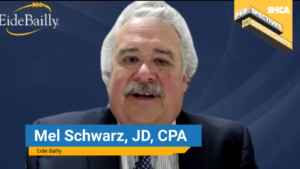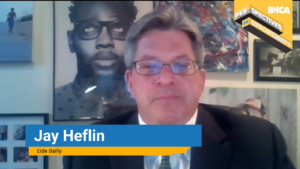
Banks may get pulled into an effort to collect more of the taxes the federal government says it is owed. Mel Schwarz, director of legislative affairs for Eide Bailly, told bankers participating in a Bank Holding Company Association virtual seminar on May 3 that Form 1099 reporting may be expanded so that banks have to report deposits and withdrawals of wealthy customers. This would include individual taxpayers and pass-through business entities.
Advocates for the effort call it a plan to close the “tax gap,” which is the difference between the amount of taxes people pay and the amount that the government believes is owed. Charles Rossotti, a former IRS Commissioner, said the gap in 2019 was $574 billion; 85 percent of that sum is owed by taxpayers in the top income quartile, according to an essay co-written by Rossotti appearing in USA Today.
Schwarz said the plan has a lot of support but procedural restrictions may make it difficult for Congress to enact. If the plan is determined to be an appropriations measure, it technically cannot be passed through the reconciliation process, which may be the way Congress attempts to advance the new tax package.
The “Rossotti Plan” is part of a major tax overhaul being proposed by the Biden Administration which could mean higher corporate, individual and capital gains taxes. President Biden recently announced plans to provide $1.8 trillion over eight years on programs designed to help families, and $2.65 trillion over eight years on infrastructure projects. The plans involve the following provisions:
- Raise the top income tax rate to 39.6 percent from 37 percent;
- Raise the top tax rate on capital gains and dividends to 39.6 percent from 20 percent;
- Expand the 3.8 percent Net Investment Income Tax to apply to other types of income currently not subject to it;
- End the step-up in basis for gains of more than $1 million at death; and
- End the tax deferral of like-kind (1031) exchanges over $500,000.

Jay Heflin, assistant director of legislative affairs at Eide Bailly, said the White House is proposing the top personal tax rate start at $452,000 for individuals and $509,000 for couples.
Republicans are united against the tax increases; Democrats are split, Heflin notes. With a six-seat edge in the House, and even representation in the Senate, many pundits expect Democrats to lose control of the House and the Senate in the 2022 election. “Many of them realize this may be their only shot at major tax legislation,” Heflin said.
Schwarz said that even if Congress does pass legislation to increase taxes, rate increases may phase in over years rather than take effect all at once. Schwarz also said there is no appetite in either party to implement new tax laws retroactively.
When President Trump led a change in the tax law in 2017, some banks changed to C corp status from S corp. Schwarz said given the expected near-term trend in taxation, it may be time again for bankers to consider whether a change in incorporation status makes sense.
